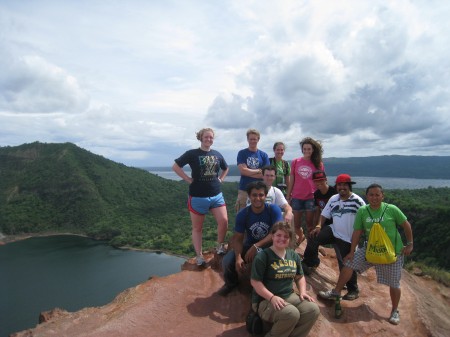A unique study abroad program at Mason has students traveling to the Philippines for a six-week long, nine-credit life-changing trip.
Al Fuertes, a New Century College professor, who specializes in community-based trauma, started the program in 2008. Although there are many study abroad programs offered at Mason, the Philippines trip is uniquely different based on three aspects of the trip, according to Fuertes.
“The trip is a grass roots peace-building excursion,” Fuertes said. “What makes this trip distinct from others is that we address conflicts from the perspective of the locals in the communities we visit. I wholly believe that the locals understand the reasoning behind the conflicts better than any outside sources.”
The trip focuses on both environmental and cultural awareness. These are two aspects that make it unique.
“The trip is very community based. Students have the chance to immerse themselves in the lives of the people in communities,” Fuertes said. “They get to experience and live the daily lives of the people in the communities, not only visit and observe. The entire country is the classroom and the people we meet, the places we visit and the stories we hear are texts and credits of experiential learning.”
Thanks to Fuertes and his efforts in establishing the Mindanao Peacebuilding Institute in the Philippines in 2000, the group of Mason students is the only one allowed to participate in the courses offered there. In this way, Mason students are offered something out of this program that others are not.
For one day during the trip, students are involved in a scavenging expedition in which they visit one of the largest landfills in the world called Smokey Mountain.
“There, more than 2,000 people reside who the government does not recognize, therefore they do not receive any government subsidies,” Fuertes said. “We have the opportunity to help these people by collecting things in the landfill such as recyclables and cashing them in for money to give back to them.”
The trip encompasses visits to multiple cities across the Philippines, utilizing the different regions to accomplish its goal of educating the students with a hands-on approach.
“As for the environmental awareness we promote on the trip. We visit Del Monte plantations where they grow pineapples,” Fuertes said. “We are informed that the company uses aerial sprays for pesticides and insecticides. These chemicals then wash away into the water systems of local villages, producing harmful side-effects for these areas. The lessons we learn from each area are very empowering.”
Other lessons learned come from unlikely sources.
“Filipino youth not in school due to lack of funds, but that are still very active in the development of their communities, teach our students on the trip about things such as plowing fields, planting crops and many other things. This experiential learning can only be taught outside the classroom,” said Fuertes.
The week-long homestay of the trip, according to graduate Chris Generous, was life-changing.
“My favorite part was the community-exposure home stay in Dumaguete City, where Mason students were paired off and grouped with a Filipino student and a local family. We spent about a week with the family. We slept at their home, played with the kids, learned about local social work programs, and sang videoke. We forged really strong ties in such a short time span,” said Generous.
The experiential learning Fuertes credits this trip as providing engages the students in ways ranging from fun activities to serious issues. “We learned about the various cultures of the Philippines,” said Generous. “We put human faces to the issue of poverty, from playing basketball to child labor.”
The group attende Mindanao Peacebuilding Institute in Davao City, where they learned from practictioners and explored environmental issues, such as mining, rice planting and marine sanctuaries.
“When students tell me that the trip made them think twice about their major and then their career, it makes the trip that much more meaningful to me knowing that it made such an impact on their lives in a positive way,” Fuertes said.
Fuertes views the last activity of the trip, a climb to the summit of a volcano, as a sort of metaphor for all those on the trip.
“The climb is a challenge, but once we get to the top, all the effort is worth it. This trip is one in which students experience life out of their comfort zones. By the end, they have realized how much more responsible they have become and how much they have learned and grown as people,” Fuertes said.







Comments